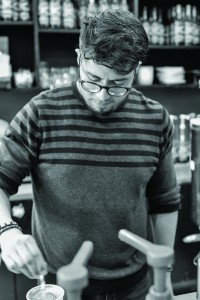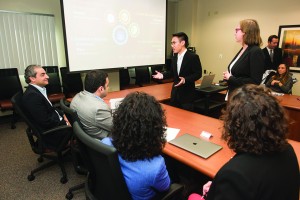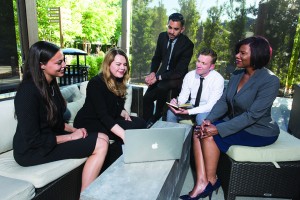By Andrew J. Skerritt

The Nazarian College small business consulting program has assisted more than 300 small businesses over four decades, including Barclays Coffee & Tea in Northridge.
Through the FOUND/LA Local Business Boost and Wells Fargo Bank, undergraduates and graduate students in the Nazarian College have made a big difference to local small businesses.
The students deploy classroom lessons in the service of entrepreneurs as they pass their final hurdle to graduation. For undergraduates in the Business Honors program, consulting is part of a three-unit capstone course, BUS 497BBH – Small Business Planning & Growth, taught each spring. It’s a requirement for all honors students in their senior year. Management lecturer Drew Foley teaches the course in collaboration with Silvina Bamrungpong, director of the Business Honors Program.
“The course is the culmination of their studies at the Nazarian College,” Bamrungpong said. “Working with a local client is a way students practice and apply their learning.”
For graduate students working in teams of four or five, their process is an evolution, as they are transformed from learners to practitioners during their consulting project, said Kristen Walker, director of the MBA program and a marketing professor at CSUN.
“It’s [fascinating] watching MBA students become accustomed to being the experts in the room, and offering advice they truly believe in because they’ve spent so much time, 15 weeks, researching and developing,” said Walker, who finds small business owners, then plays matchmaker between clients and students and creates the student teams. “It’s very empowering for the MBA student, right before they graduate.”
AN IMPRESSIVE TRACK RECORD
The Nazarian College has established an impressive track record of providing small business consulting for more than four decades. During that time, more than 300 small businesses have benefitted from the college’s consulting program. The program received a substantial boost in 2019, when it formed a partnership with FOUND/LA, an initiative of the Wurwand Foundation designed to offer financing, mentorship and educational resources to local businesses.
Jane and Raymond Wurwand are the founders of Dermalogica, a global skincare brand that the two immigrants began with a $14,000 investment. Their success in transforming a small business into an industry juggernaut inspired the couple to support local entrepreneurs through FOUND/LA.
The organization’s support of $425,000 over five years to the Nazarian College provides student scholarships and helps cover the administrative and other costs of the Small Business Consulting Program. In 2020, when announcing FOUND/LA’s expanded commitment to the consulting program, Jane Wurwand heaped praise on the students.
“The single most persuading factor for us was the students,” she said. “I thought, ‘This is the energy, this is the hunger, this is the tenacity that makes successful entrepreneurs.’”
Wells Fargo also recognizes the program’s impact on the small business community, and has dedicated $150,000 since 2019 in support of the program and its students.
“At Wells Fargo, we are committed to investing in the future of our next generation of leaders,” said Robin Choi, Wells Fargo San Fernando Valley Region Bank president. “Through our continued support, our hope is that CSUN students will continue to provide guidance to the small business community in the San Fernando Valley.”
GETTING HELP
The program’s consulting clients must meet specific criteria: They must be in business for at least two years, have annual revenues of at least $100,000 and be willing to share two years’ worth of financial statements. They must also commit to a two-hour initial intake meeting, two to three meetings with students throughout the semester, and attend the student presentation at the end of the semester. In addition to the 100 to 200 hours they dedicate to supporting their clients, students also attend the capstone class for three hours a week.
Bamrungpong and Foley hold a virtual pre-intake meeting with prospective clients to assess their commitment to participating. Afterward, Bamrungpong sends the business an intake form to gather information about the client: their pain points, challenges and future aspirations — where they see themselves in several years — as well as demographic and general information and two years’ worth of financial statements.
Student teams are created based on their interests, skills, background and other factors. Each three-, four-, or five-person team includes a team lead (the main point of contact with the client), a financial adviser and a marketing adviser.
“We want to get an idea of what skill sets the students are bringing in,” Bamrungpong said. “We take the information and pair students with the best possible client so that we could position them on a successful path.”
The two-hour intake meeting often sets the tone for a productive relationship between consultants and client, students and business owner.
“Students are interested in the client,” Bamrungpong said. “They have done their homework and invested the time in reviewing the client’s financials. They come prepared with questions. They desire to know the client’s story, their background, who they are, not just about their business. They begin to build a relationship. They ask great questions, and the story evolves and reveals itself. That makes for an excellent meeting.”

Business Honors students present their recommendations to their small business clients at the end of the semester.
SATISFIED CLIENTS
Stevie Howell, a business which offers “sustainable textiles for artful living,” is one beneficiary of the program. Owner Stevie Howell, who started her firm in San Francisco before moving to L.A.’s Venice neighborhood, received consulting assistance from an award-winning team of Sara Alteryd ’20 (Marketing and Business Honors), Leila Esmaeili ’20 (Finance/Financial Analysis and Business Honors) and Marketa Pospechova ’20 (Systems and Operations Management and Business Honors). From the first introduction, client and student-consultants formed a bond.
“They were all passionate about my business,” said Howell, whose website boasts “eco-friendly home textiles, wallpaper and luxury loungewear in original prints.” “They got the environmental and social aspects [of] my business; they got the care that is put into each project. I appreciated that they understood and respected my purpose and my vision.”
As a one-woman operation, Howell found having three consultants working alongside her transformational.
“It allowed me to step back from the day-to-day stresses and see my business through somebody else’s eyes, especially the financials,” Howell said. “It was good to get a big picture of the business. I was so involved in the day-to-day operation of the business, it was hard to step back and look.”
By examining Howell’s financials for the previous three years, the team was able to show her the venture’s profitability and operating margin ratios. At the time, Howell was redesigning her website.
“They had this recommendation to keep my value proposition and mission in mind as I was updating my website, to tell more of a story about the business,” Howell said. On the financial side, they recommended that she restructure her accounts in QuickBooks, so she could see how the various aspects of her apparel and home décor business were performing. She worked with a bookkeeper to restructure the accounts.
When the pandemic hit, Howell started making facemasks, so she was able to help keep her factory suppliers open. She also created a free coloring book for kids and launched a wallpaper collection. “That [collection] has started to show some good sales,” she said. “We are moving in the right direction.”
Meanwhile, another team was consulting with a business that sold tea and scones at a storefront. After the pandemic shut down the storefront, the team examined the logistics, the website, marketing and the ordering process. They came up with a plan that helped the business increase Mother’s Day orders by more than 250 percent, Bamrungpong said.
TEAMWORK AND IMPROVISATION
Team leader Alteryd said one of the biggest takeaways from their project with Howell was the value of teamwork.
“We all collaborated and complemented each other very well. We knew each other from working on so many other projects,” she said. “You know each other’s strength. You knew what each person was good at. We had an amazing team. It was so easy for us to deal with any type of issues.”
The pandemic complicated their lives and the consulting assignment. “A part of the project was working with the entrepreneur on how to pivot, how to make a marketing plan — [and] pivoting from the fashion to the home décor,” Alteryd said. “It was amazing using the knowledge I learned in the classroom. It gave me more confidence going out into the real world.”
During their project, Alteryd and her teammates also learned the importance of improvisation: tailoring the project to the specific needs and tastes of the client. Since Howell is an artist, Alteryd said, the team decided to forego the standard template for the project and use the business owner’s prints and her colors.
Their project also impressed the business community. In February 2021, the team earned first place in the Comprehensive Project of the Year, the largest and most competitive category at the 2021 Small Business Institute Competition and Conference. “It wasn’t just a school project,” Alteryd said. “When working in consulting, everything is about the client.”

MBA graduate students work in teams of four or five to evaluate their small business clients.
While Alteryd and other undergraduates bring a certain passion and enthusiasm to their consulting tasks, graduate students in the MBA program also deliver the benefit of their longer work experience when consulting with small businesses. That was very evident during the pandemic, said Walker, the MBA program’s director.
“MBA students have offered hope to small businesses,” she said. “Our students are really great at taking their experience, since they are professionals, and connecting with small-business owners. That really says, ‘We can help. We are going to show you how.’ That’s important.”
The payoff, Walker said, is watching the students after they present to the client and watching the client’s reaction to the valuable information they receive.
“MBA students are learning at a high level and taking it back to their work,” Walker said. “Consulting with a small business gives them the chance to practice all of those skills. I really try to put them with a small business that is different from the industry they are currently working in. The results deserve a top grade.
“It’s a win-win,” she continued. “It’s a positive and valuable experience for both the clients and the students.”
To learn more about the small business consulting program, visit csun.edu/nazarianconsult.
